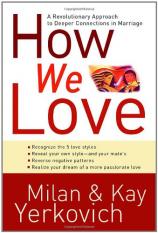How We Love: A Revolutionary Approach to Deeper Connections in Marriage
Review
How We Love: A Revolutionary Approach to Deeper Connections in Marriage
Husband and wife Milan and Kay Yerkovich have compiled an intriguing body of counseling scenarios detailing their imprinted love styles. Thoughtfully presented, the text breeds understanding and compassion between spouses who are struggling to make their marriage work. The authors base much of their material on the premise that adults continue to live out in patterns of communication and intimacy largely based upon what they learned and experienced in their childhood home. Thus stated, the Yerkovichs offer lengthy case studies and examples of what each "love style" looks like and how it conflicts with others.
Between the two of them, this professional couple has over 25 years of pastoral counseling experience (Milan's) added to 13 years of marriage and family counseling (Kay's) --- not to mention the fact that they've learned a lot firsthand through the ups and downs of their own 33-year marriage. For openers, the Yerkovichs offer a single question upon which the foundational principle of the book is based: "Can you recall being comforted as a child after a time of emotional distress?" During the first 18 years of life, every person needs deep emotional comfort extended through meaningful touch, empathetic listening that validates feelings and some sort of soothing relief. If any of these elements are missing, then real comfort is lacking.
The authors write that roughly 75 percent of adults they surveyed did not have a single memory of receiving comfort from a primary caregiver as children. Thus, the answer to this key question will determine in large part how one responds in marriage when life gets tough. If a person was comforted early on, then they seek relationships as safe havens during times of trial. Conversely, if an individual lacked meaningful emotional comforting during childhood, reaching out for help from a mate will not come naturally. Hence, the birth of an impasse between the majority of married couples.
According to the Yerkovichs, there are five harmful love styles.
- The avoider doesn't place a lot of stock in feelings or in being comforted. He prefers space, autonomy and is highly task-oriented.
- The pleaser recoils from rejection and criticism. He moves quickly through any conflict and dreads emotional distance from his spouse.
- The vacillator is overly sensitive. Fluctuating between being angry or disappointed with others, he often feels conflicted.
- The controller responds to disorder by dominating people and situations through anger and intimidation.
- The victim takes a passive role to protect against pain yet is inwardly resentful and angry.
Following a thorough examination of each love style, the authors provide a section on the damage that results from these marriage "duets" when not properly recognized and addressed. Readers will find the various combinations both fascinating and grievous, as they observe the inner pain that both partners unwittingly unleash upon one another. In the final segment, solutions are presented through carefully constructed patterns for emotional growth and health. Individuals first must become aware of their own love styles and that of their mate's, learn to engage safely and lovingly, and then explore via active listening for eventual resolution to problems.
The Yerkovichs supply thought-provoking, if sometimes painful, exercises for couples to engage in, yet their overall message is resoundingly hopeful and their belief that people can change through this methodical system is convincing.
-
Reviewed by Michele Howe on November 13, 2011





